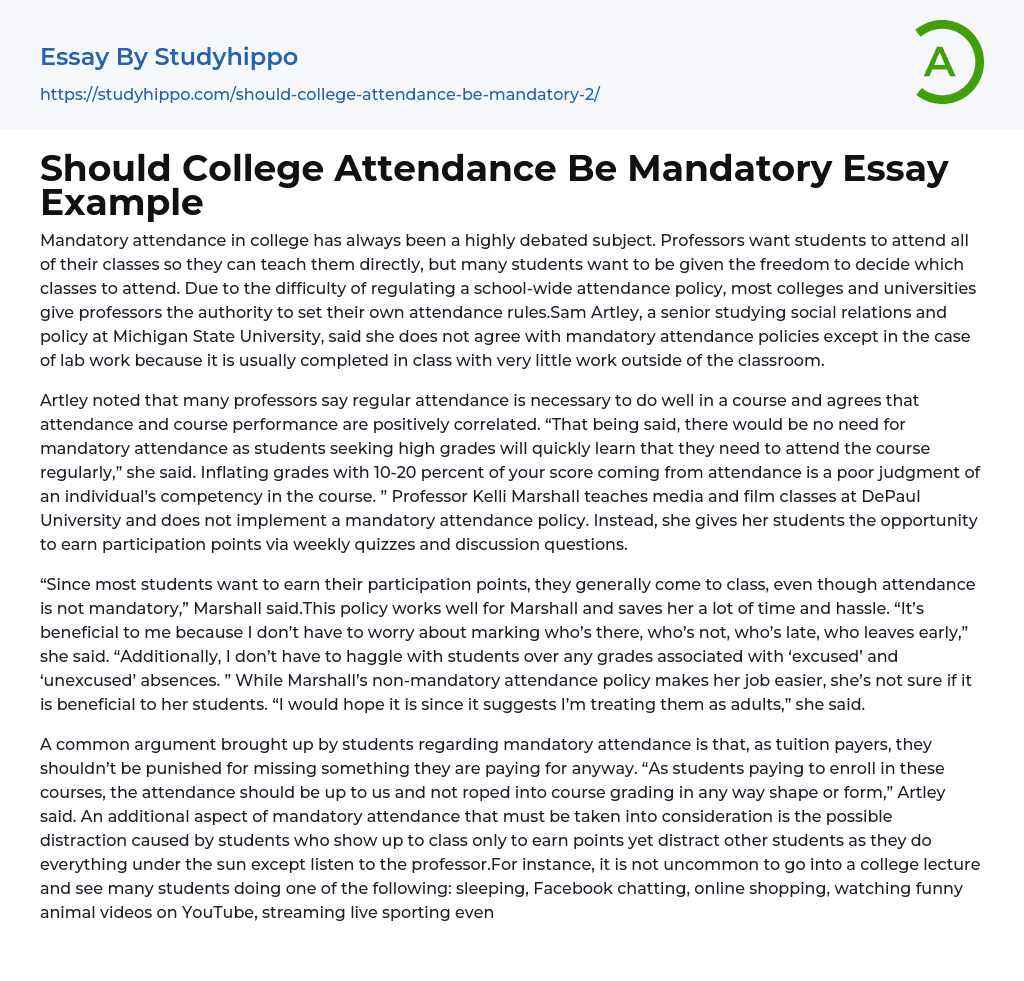Discussion about mandatory attendance in college has always been controversial. Professors want students to attend their classes for direct teaching, while many students want the freedom to choose which classes to attend. To address the challenge of regulating school-wide attendance policy, most universities allow professors to set their own rules. According to Sam Artley, a senior at Michigan State University studying social relations and policy, she disagrees with mandatory attendance policies, excluding lab work since it usually involves minimal work outside the classroom.
According to Artley, many professors stress the importance of regular attendance for academic success and she agrees that attendance and course performance are positively linked. However, Artley argues against mandatory attendance policies, stating that diligent students will naturally recognize the necessity of regular attendance. Additionally, she suggests that allocating a
...percentage of grades for attendance is an inadequate reflection of a student's competency in the course. Conversely, Professor Kelli Marshall of DePaul University does not enforce a mandatory attendance policy. Instead, she offers her students the chance to earn participation points through weekly quizzes and discussion questions in her media and film classes.
According to Marshall, most students attend class in order to earn their participation points, despite the fact that attendance is not required. Marshall finds this policy beneficial as it eliminates the need to keep track of attendance and associated grades, saving her time and hassle. Marshall believes that treating her students as adults is important, though she is unsure if her non-mandatory attendance policy is beneficial to them.
One common argument against mandatory attendance is that students who pay tuition should not be penalized for missing something they are already paying
for. Artley believes that attendance should not be tied to course grading, stating, "As students paying to enroll in these courses, the attendance should be up to us and not roped into course grading in any way shape or form." Another issue with mandatory attendance is the potential distraction caused by students who attend class solely to earn points but distract others. It is not uncommon to see students doing unrelated activities such as sleeping, chatting on Facebook, shopping online, watching videos or live sporting events, or pinning wedding dresses on Pinterest. Sarah Griffin agrees that missing numerous classes should not be acceptable but believes that a policy requiring attendance at every class is too restrictive.
Griffin suggests that professors should have mandatory attendance policies with some allowances for absences. She believes that at the university level, students have the right and responsibility to manage their time but penalizing students for missing a lecture in favor of working on a semester project would be unfair. Currently, most of Griffin's professors either have no attendance policy or allow students to miss a certain number of days without penalty, which she prefers as it gives students appropriate control over their schedules. While Griffin does not object to professors having attendance requirements, she acknowledges that not all of her peers share her view.
According to Griffin, she attempts to attend her classes regularly for the purpose of learning from the lectures. However, she recognizes that various other students have their unique learning approaches and would rather acquire knowledge and understanding independently. Thus, she suggests that a strict attendance policy may only be hindering for these students. In her
perspective, the attendance policies should equitably balance the preferences of both sides. As stated by Griffin, “We are adults, but also college students at the same time.” She assumes that universities should regulate the attendance rules to some extent, but the responsibility to achieve excellence in education should primarily fall on the students themselves. Therefore, Griffin firmly believes that attendance policies should align with this notion of individual agency.
- Professor essays
- Should College be Free essays
- Should college athletes be paid essays
- College Education essays
- College Tuition essays
- Graduation essays
- College Goals essays
- Personal Statement essays
- Online Classes Vs Traditional Classes essays
- Online Education essays
- Student Loan essays
- Study Abroad Scholarship essays
- Reasons To Go To College essays
- Paying College Athletes essays
- Technology In The Classroom essays
- Academia essays
- Higher Education essays
- Language Learning essays
- Studying Business essays
- Education System essays
- Study essays
- First Day of School essays
- Scholarship essays
- Pedagogy essays
- Curriculum essays
- Coursework essays
- Studying Abroad essays
- Philosophy of Education essays
- Purpose of Education essays
- Brainstorming essays
- Educational Goals essays
- Importance Of College Education essays
- Brown V Board of Education essays
- The Importance Of Higher Education essays
- Online Education Vs Traditional Education essays
- Academic And Career Goals essays
- Academic Integrity essays
- Brown Vs Board Of Education essays
- Distance learning essays
- Technology in Education essays
- Vocabulary essays
- Writing Experience essays
- Importance of Education essays
- Early Childhood Education essays
- Academic Degree essays
- Academic Dishonesty essays
- School Uniform essays
- Academic writing essays
- Cheating essays
- Bachelor's Degree essays




